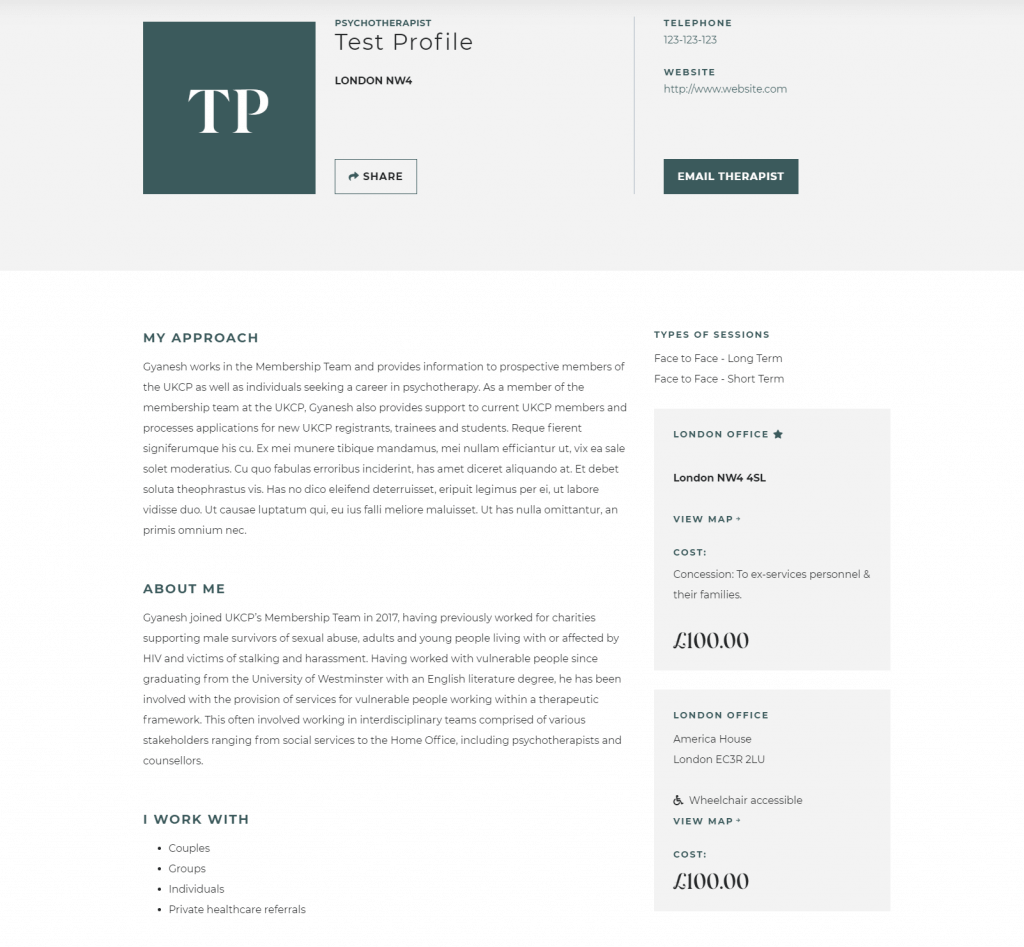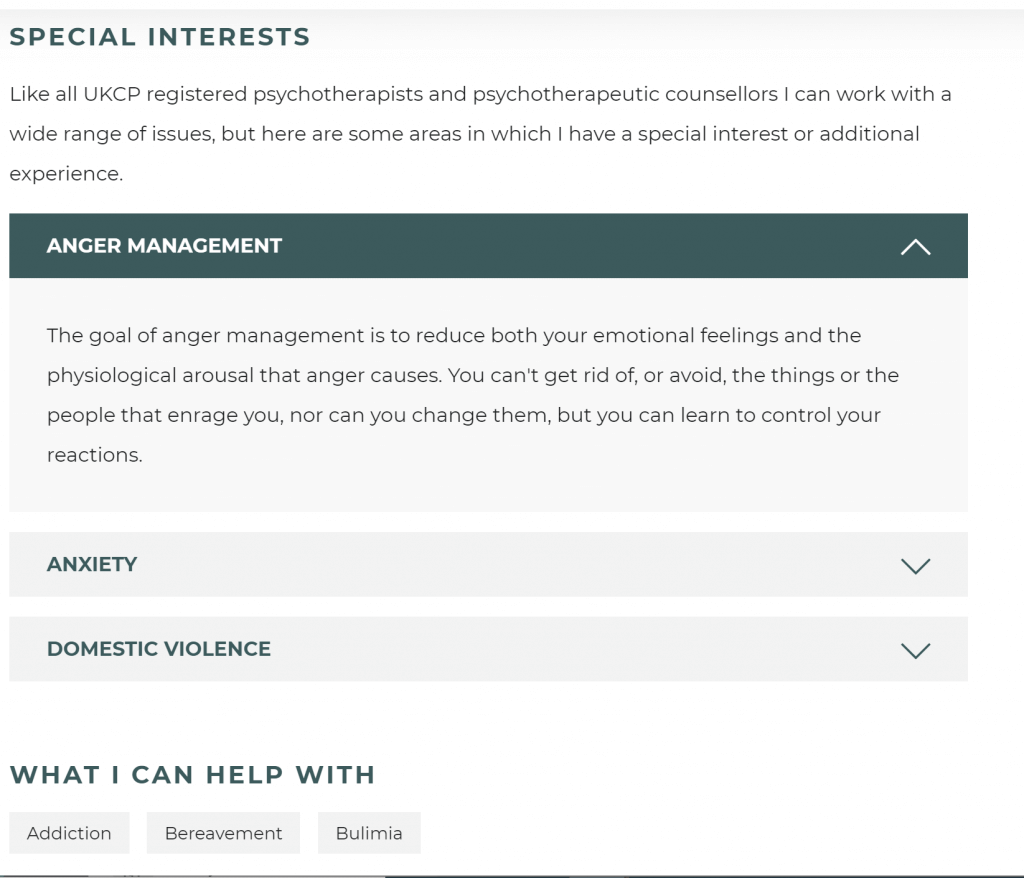
Building a better Find A Therapist for you and your clients
Over 400,000 people visit UKCP’s website every year, and we know that at least a third of them, likely more, are seeking a therapist. They represent the largest single group of users on our website, so we have redesigned our website to serve them as our highest priority audience.
They’re not our only important audience of course. The better that our Find A Therapist tool works for members of the public, the better it works for UKCP members too, because the easier it is to use the more people will complete their journey on the website and get in touch about working with you.
‘It’s very easy to give yourself an excuse not to go through with it’
– research participant
We carried out research with members of the public – some who had previous experience of psychotherapy, some that hadn’t – as well as UKCP members, and a range of professionals from healthcare, education, and other sectors to improve the design, making it more user‐friendly and providing a greater range of search and filter options.
‘If you struggle, you’ll blame yourself, not the website’
– research participant
One of our main aims on the project was to make Find A Therapist more ‘friendly’ for users. We know that at the point when someone is thinking about seeking therapy they may well be feeling lost, in distress, or even in crisis. We have tried to design Find A Therapist with that in mind, breaking down the process to help it feel more manageable and allow people to proceed at their own pace.
‘Even with small difficulties you can feel like “this is too much”
– research participant
Simple search
One of the problems that our user research revealed was that visitors often felt overwhelmed by all the different search fields they were presented with at once. They missed the note saying that the fields were optional, and felt that they needed to fill everything out, often struggling to understand more specialist terms.
‘I’ve got my issue and my postcode, I would expect that to be enough’
– research participant
‘I want to search by issue, then location. That’s all I need’
– research participant
We have added a simple search at the top of the Find A Therapist page, and on our new homepage. It contains the following fields, which reflect the way that people typically approach finding a therapist:
- What is the issue you would like to talk about? We know of course that our members can work with all kinds of issues, and what the client presents at first might not be the whole story, but it’s important that Find A Therapist ‘meets people where they are’.
- Are you looking for in-person or remote therapy? This has of course become an even more important question in 2020.
- If ‘in-person’ is selected – where would you like to meet with someone? People can enter a full or partial postcode, address, town or city name and they will see the results for that location.
Remote psychotherapy
Our initial user research interviews took place on the last day that I was in the office before we went into lockdown, in fact one of our interviewees was masked.
As it became clear that the impacts of COVID-19 on the delivery of psychotherapy would be long lasting, we conducted additional user research via online survey to understand the emerging behaviours and expectations around remote therapy.
We found that more than 80 per cent of respondents said that they are more likely to want to work remotely in the wake of COVID-19, citing accessibility, flexibility and savings on costs and time of travel as advantages.
Our interviews with members of the public before lockdown showed that location was one of the top three criteria used to choose a therapist. But for people seeking a therapist to work with remotely, they were looking for, in order:
- experience dealing with their specific issue
- fees that matched their budget
- someone who seemed friendly and approachable.
Advanced search and filter
Once people have completed a simple search, there are advanced search and filter options available to them on the left hand side of the page beside their search results. We wanted to keep everything on one page so that people can try different filters or key words, and their search results will automatically update with the most relevant results.
At the top of the panel is a keyword search, which searches all the copy in all the profiles.
Below that is a distance slider, so that people can easily adjust for 1 mile, 3 miles etc. When more than one result is returned at the same address or postcode, the results are randomized for fairness.
Next there are a range of ways that people can filter their results:
- Type of session eg in person short term, in person long term, online, by phone, home visit
- Further issues people may want help with
- Client group, eg couples, families, children
- Type of therapy, where people can select from titles such as Existential Psychotherapist
- Languages spoken
- Only show profiles with photos
- Only show profiles with wheelchair-accessible locations
- UKCP college, included for members or other professionals who sometimes use Find A Therapist to make referrals.
We’ve made some changes to the template for therapist profiles in Find A Therapist, informed by our research with members of the public and tested with both the public and with UKCP members.
- Essential info like your contact details and the link to your personal website are now at the top of the page, and repeated at the foot of the page to encourage people to get in touch.
- We have included a free text area titled ‘About me’, as our research showed that users responded well to a warm, fairly informal tone in the first person in profile copy.
- We’ve added a free text area called ‘My approach’, where you can write about how you work, to help the potential client learn what working with you might be like and decide whether they think you might work well together.
- As well as the full list of issues that you can work with a client on you can now select five special interest areas to highlight, with a free text box for each if you’d like to say something about them.
- Rather than a miniature map on your profile which is difficult to use (especially on a mobile) a map link is generating so that users can open the location map in their Google maps app or in a new window, and navigate around it more easily.


Ultimately, Find a Therapist is only as good as the data it contains. It’s important for all UKCP members on Find a Therapist to complete their profiles. By doing so, you will help improve Find a Therapist’s ranking in Google, and the chance that an individual will find a safe, ethical, high quality therapeutic relationship which is right for them.
How to get the most out of Find A Therapist
Add a profile picture
‘I found I was skimming over people without profile pictures’
– research participant
Our user research participants unanimously preferred profiles that had a photo, because along with what the therapist had written in their profile it helped them to get a sense of who they would be talking to. Any profile picture was preferred over none, but it was head and shoulders photos of the therapists themselves which got by far the best response.
Use a conversational tone of voice
‘I have a reputation for compassion” sounds like a job application’
– research participant
One of our research participants’ top criteria when they were choosing a therapist was that they seemed ‘friendly and approachable’, and most preferred profiles that were written in an informal, first person, conversational tone of voice. For example ‘I specialise in…’ rather than ‘Jonathan specialises in…’ or ‘We will meet for an initial session to talk about the issues that have led you to seek help from a therapist…’ rather than ‘Clients attend an initial assessment meeting where their presenting needs are discussed…’
Think about what the client most wants to know
‘The type of training they’ve had is the last thing I would care about’
– research participant
‘I want to know more about the experience than the discipline – what would we be doing? Journalling, being in a group?’
– research participant
Research participants were reassured when therapists included their qualifications on their profile, but they were put off by profiles that read too much like a CV or a journal paper. They wanted to understand what working with this person might be like, what would be involved, and how it could help them.
Use familiar words and avoid jargon
‘Their language seems academic rather than supportive’
– research participant
As our user research participants navigated Find A Therapist and individual therapists’ profiles they often came across specialist terms, especially around modalities and titles eg ‘Process Oriented Psychotherapist’ or ‘Systemic approach’. Typically they would get distracted from their goal, instead trying to guess at what these terms meant and understand whether they were relevant to their specific issue.
Try to use words that people might use themselves to describe their feelings and problems. They might think of themselves as having problems with their sex life rather than sexual dysfunction, for example, or see themselves as unhappy rather than suffering from emotional distress.
Include your fees and whether concessions are available
‘It’s difficult to contact people to find out if you can afford them, it can feel humiliating’
– research participant
Participants reported that one of the most important criteria when choosing a therapist would be cost. Although they understood that they could contact a therapist and ask about their fees before meeting for a first session, it’s clear that for some people this was a barrier in itself.
I hope you find these insights interesting and useful, and I look forward to being able to share the whole of UKCP’s new website soon.
Share
Like most websites, we use cookies. If this is okay with you, please close this message or read more about your options.

